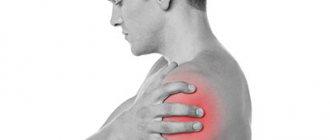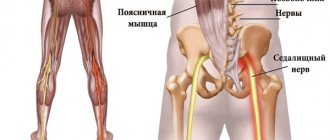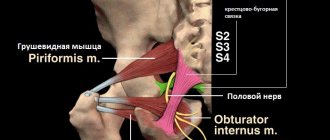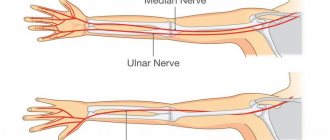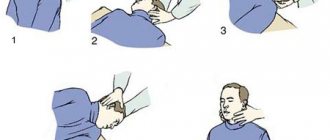If you've only had one pinched nerve in your life, consider yourself lucky, as this painful condition tends to recur. Depending on the location in the body and the severity of the problem, the pain can be quite severe.
A pinched nerve means damage caused by compression, narrowing, or stretching of the nerve.
Trauma or poor posture during the day or during sleep are the most common causes of a pinched nerve with subsequent inflammation. Other causes include arthritis, misaligned vertebrae, bone spurs and herniated discs.
If a nerve is pinched, the following symptoms may occur: numbness, burning, or sharp pain that radiates to other parts of the body. Sometimes symptoms get worse when you try to make certain movements, such as turning your head or straining your neck.
A pinched nerve often occurs in the neck or lower back, but the pain can travel to the elbows, arms, wrists, or fingers.
Pain from a pinched nerve can make you miserable when it interferes with your daily activities and even sleep.
If not treated promptly, it can lead to carpal tunnel syndrome, bursitis (tennis elbow), sciatica and other serious conditions.
A pinched nerve can usually be treated at home, as many home remedies can relieve symptoms and promote healing. But if the pain is so severe that it affects your ability to move, you should see a doctor.
Below are the 10 best home remedies to treat a pinched nerve.
Correct your posture
Since poor posture is one of the leading causes of nerve impingement, the first thing to do is improve your posture, changing it in sitting and standing positions will help relieve pain and may even reduce compression and narrowing of the nerve.
If you have a pinched nerve in the cervical spine, be sure to keep your chin in a neutral position—not too far forward or back. At the same time, your shoulders should be in a vertical plane. This position can be maintained by gently squeezing your shoulder blades together.
Always sit up straight and keep your body straight and upright while walking or standing. Don't hunch over. By focusing on maintaining proper posture, you can easily heal a pinched nerve in your neck or back.
How to treat a pinched nerve. Treatment at home
It is important to understand that no folk remedy can replace complex therapy.
You shouldn’t completely exclude treatment at home; you just need to combine it with what the doctor prescribed for you. Before using this or that remedy, check with your doctor to see if it can be combined with the main treatment. In other words, it is necessary to obtain the approval of the treating specialist to use home medicine. There are several treatment options:
- use of ointments;
- taking baths;
- applying compresses;
- taking tinctures and decoctions.
Neuralgia of the sciatic nerve in the acute period cannot be treated with compresses and baths, as this can aggravate the patient’s condition.
Even if you managed to relieve the pain with medicine or an injection, you need to wait a while before taking a bath.
So, what to do and how to treat the sciatic nerve at home will be discussed below.
Ointments
You can soothe the irritated area with a product such as a warming ointment. You can prepare this medicine at home.
Recipe No. 1
Ingredients:
Fir oil
Valerian tincture
To prepare, use the indicated ingredients in a 2 to 1 ratio and mix thoroughly. This ointment is rubbed in three times a day. Help does not come immediately; after the procedure, you need to wrap the affected area and take a lying position.
Recipe No. 2
Ingredients:
Bay leaves (fresh)
Juniper needles
Butter
The indicated ingredients are taken in a ratio of 6:1:12, mixed until smooth (the leaves and needles are crushed). This remedy must be used in the same way as the previous one.
These recipes will help cure neuralgia and allow the patient to forget about the pain syndrome for a long time. In addition, you can use these ointments for massage.
Decoctions
Treatment of the sciatic nerve at home includes not only external use, but also oral administration of medications.
So, decoctions can relieve pain and help the patient.
Ensure a state of rest
Regardless of where the nerve is pinched or what caused it to be pinched, you need to provide a state of rest to the affected area of the body, and the longer this lasts, the better. Sometimes this is difficult to do, but remember that rest for nerve healing cannot be underestimated.
In fact, rest is a very effective way to treat a pinched nerve in the neck, for example.
Avoid any activities that cause you pain, such as tennis, golf, or sedentary work. Remain quiet until the pinching symptoms are completely relieved.
Along with limiting daytime activities, increase the amount of sleep you get, which will give your body more time to heal. If necessary, use a neck brace to limit movement while you sleep. Avoid sleeping on your stomach; Try sleeping on your back or side.
To quickly heal a pinched nerve in your lower back, try to raise your legs a few centimeters when you lie down while sleeping or resting.
Pinched nerve under the scapula. Why does a nerve become pinched?
For what reason does pinching occur, and why specifically in the shoulder blade? After all, there are nerves throughout the spine. This is true, but it is in the thoracic area, where the shoulder blades are located, that the nerves are most susceptible to various influences. Second in line is the back, which is supplied with lumbar nerves. A person may also experience pain in the shoulder, collarbone and neck when the nerves of the cervicothoracic area are pinched.
Pain may radiate to the neck
This diagnosis is noteworthy in that a person often makes it himself, saying that a nerve is pinched, and a compress or poultice at home, without bothering to see a doctor, or it will go away on its own. And in most cases, especially if the scapular nerve is inflamed due to hypothermia, the pain actually begins to subside the very next day.
Prices for painkillers for back pain
Important! But a pinched nerve in any part of the spine is a symptom that needs to be addressed by a doctor. No pain arises in the body just like that. And the diagnosis signaled by this symptom can only be established by a medical professional.
The cause of the pain must be determined by a doctor
It’s worth starting to understand the problem with the question: how does pinching occur? It occurs due to the fact that the nerve is compressed by the tissues surrounding it. This can be bone or cartilage tissue, muscle or tendon tissue. For this reason, pain can occur at any spinal level.
By the way. Nerves can become pinched not only in the spine; facial, radial, ulnar nerves and so on can also be pinched, causing pain in the corresponding organs.
The disease is spread throughout the body and occurs in a large percentage of patients, but as such there is no diagnosis of “pinched nerves”. This is because it is not a disease, but only a symptom of it. And not even one, but many diseases. This is why diagnosis is important to identify the cause of the pinched nerve.
It is important to undergo an examination and find out the cause of the pinched nerve.
Why a nerve may become pinched:
- due to injury;
- due to tumor;
- a growth forms on the bone tissue;
- the patient leads a sedentary life;
- he experiences excessive stress;
- there is an intervertebral hernia;
- osteochondrosis is present;
- hypothermia occurs;
- disc protrusions are formed;
- this is a consequence of arthrosis;
- the patient has arthritis;
- gastrointestinal diseases;
- there are diseases of the endocrine system;
- tumor-like formations;
- history of an autoimmune disease.
The nerve can be pinched due to herniated discs, as well as for many other reasons.
As you can see, there are many reasons for a nerve to be “pinched.” There are also indirect accompanying circumstances that will help or provoke the process. Excess weight and old age, damage to posture and hereditary factors, as well as pregnancy, are called provoking factors.
Nerves can become pinched during pregnancy
The following can directly cause an attack of pain from a pinched nerve:
- lifting weights, if you do it abruptly or take significant weight;
- a certain position that is not comfortable that a person takes during sleep;
- sleeping on a mattress that is too hard/soft or of poor quality;
- being in a draft, wind, or low temperatures;
- overeating with existing obesity;
- injury to the back or chest.
A nerve may be pinched due to an uncomfortable posture during sleep.
These reasons are secondary. And, unlike the list of reasons given above, they are much easier to deal with. In a short time it is possible to return to your normal life and stop experiencing pain. If the problem is a disease, then the patient must undergo long-term complex therapy so that pinching does not recur.
Important! Neither in the second, nor even more so in the first case is it possible to self-medicate. Yes, if constriction occurs for a secondary reason, it is enough to limit yourself to ointments, compresses and certain medications, but in order for them to be prescribed correctly, you need to go to the doctor.
Use a cold compress
For temporary and quick relief from pain resulting from a pinched nerve, you can use a cold compress. The cold temperature will help relieve pain (as well as reduce swelling and inflammation) by numbing the affected area.
1. Place a few ice cubes in a sealed plastic bag.
2. Wrap the ice pack in a hand towel.
3. Press this bag onto the area with the pinched nerve for 10-15 minutes.
4. Repeat every hour or so if necessary.
Note. . Never apply bare ice directly to your body as it may cause a “burn” to the skin.
How to treat a pinched nerve at home. Treatment of a pinched nerve
If you find signs of a pinched nerve, you need to consult a neurologist. But before you get an appointment, you can ease your condition a little. You can put a mustard plaster on the painful area or apply a warming ointment. Through local action, the thermal procedure will relieve pain for a short time. You can take any painkiller, but you shouldn’t get too carried away with them. In addition, it is necessary, if possible, to eliminate the causes of the pinched nerve. There are not so many external reasons, these are:
- Fatigue associated with increased load on the spine;
- Hypothermia;
- Traumatic impact.
- Intervertebral hernia;
- Radiculitis and other diseases.
In order for the treatment of a pinched nerve to produce positive results, an integrated approach to the problem is necessary. Your doctor will tell you how to treat a pinched nerve with medications. Nowadays, there are a huge number of non-steroidal anti-inflammatory drugs that are successfully used. Along the way, physiotherapeutic procedures are prescribed: DDT, UHF, reflexology. The patient should also know what to do if a nerve is pinched at home, and how to organize their routine.
Here are the basic requirements:
- Sleep on a hard, flat surface;
- Carefully follow the recommendations of the neurologist.
It has gained wide popularity for the treatment of pinched nerves. Let's take a closer look at how to use it correctly.
Massage for pinched nerves
Let's start with the fact that in the acute period, massage with a pinched nerve is contraindicated! This procedure should be carried out only by a medical specialist and only when the disease is not exacerbating. Massage is carried out in long courses, 10-15 sessions, and repeated courses can be carried out for preventive purposes. In the media you can find many advertising offers from specialists in manual therapy, but if you risk contacting one of them, you must be absolutely sure that the manual is familiar with medicine first-hand. Hence the conclusion: a good massage is a massage in a medical facility.
Apply heat
After the first day (24 hours) of suffering from a pinched nerve, you can apply heat to the affected area to relax the muscles that may be tight around the nerve.
Warmth provides comfort and helps the healing process as it improves blood circulation in the area of the damaged nerve.
1. Soak a cloth in warm water and squeeze out excess water.
2. Apply a warm compress to the affected area for 10 minutes.
3. Repeat as necessary.
You can also use a heating pad or hot water bottle.
Take an Epsom salt bath
Magnesium is crucial for the treatment of neuralgia. Epsom salt (Epsom salt, magnesium sulfate) is one of the best ways to maintain proper levels of magnesium in the body, which absorbs it very quickly from this salt.
Epsom salt also acts as a natural anti-inflammatory and can also help relax tight muscles around the pinched nerve area.
1. Dissolve 1 cup of Epsom salts in a bathtub filled with warm water.
2. Immerse your body in this solution for 15-20 minutes.
3. Use this home remedy 2 times a week until your condition improves.
Massage with warm oil
Massaging the affected area of the body with warm oil is another effective way to combat the sharp pain caused by a pinched nerve.
Massage activates pressure points, which in turn increases blood flow, relaxes stiff muscles, improves mobility and reduces pain.
1. Apply (by rubbing) a little warm oil of your choice - mustard, coconut or olive oil - onto the affected area of the body. If desired, you can add a few drops of peppermint oil.
2. Massage the area with soft strokes for 10-15 minutes.
3. Do this 2 or 3 times a day until you notice improvement.
Ask someone to help you if you cannot easily reach the affected area with your hand.
Use a castor oil pad
Castor oil is also useful in treating a pinched nerve. Its anti-inflammatory properties may help reduce inflammation and pain, helping to restore normal nerve function.
The correct way to use castor oil to relieve acute muscle and nerve pain is to create a castor oil patch.
- Fold a small piece of wool flannel fabric into quarters.
- Soak the folded cloth in warm castor oil, carefully removing any excess.
- Place a warm oil cloth on the affected area.
- Cover it with a piece of plastic and then a thin towel.
- Place a heating pad on top of the towel to keep the oil as hot as possible for about 1 hour.
- Repeat this treatment every few hours, daily, until your pain goes away.
Do stretching exercises
Gentle stretches can help relieve pressure on the nerves and relieve the symptoms of a pinched nerve. These exercises will ensure good blood circulation and relax stiff muscles, thereby aiding the healing process.
Stretching exercises can be done while sitting at your desk watching TV or during a few minutes of break at work.
• If you have a pinched nerve in your neck, slowly rotate your neck in a circular motion with your head clockwise and also in the opposite direction to stretch the pinched muscles. You can also slowly move your neck back and forth and from side to side.
• If there is a pinched nerve in your hand, rotate your hands and wrists clockwise and vice versa.
You can ask your doctor about other stretches that can increase circulation and mobility in the area of the pinched nerve.
How does compression of the median nerve manifest?
Through the carpal tunnel (the same as the carpal tunnel), the median nerve passes to the hand at two levels: through the wrist joint and above it. The sensitive part of the median nerve passes over the joint, which on the hand itself is divided into small branches, and these branches are different for each person - concentrated or scattered. Inside the wrist joint there is a muscle branch that goes to the thumb and allows you to clench your hand into a fist.
The first sign of the syndrome is bursting night pain in the hand. “Goosebumps” run all over the fingers of the hand, except the little finger. The pain is exhausting and excruciating and can radiate to the forearm or shoulder. A person wakes up in the middle of the night in pain and has to get up to rub his hand, put it down and shake it. When the hand goes down, the pain subsides, but when you try to lift it, it resumes. Sometimes you have to spend several hours like this. The hand swells, women cannot wear their usual rings. If you tap your wrist, the pain intensifies. It becomes difficult to retract the thumb. Simple housework - wringing out clothes, knitting, sewing - causes pain even during the daytime.
If the median nerve is compressed in the upper part of the forearm, the forearm will become very painful. This happens to those who, due to the nature of their work, often have to turn their hand up and down while holding an object with their fingers. These are drivers, carvers, hand milkers, painters, and artists. The pain first appears after carrying heavy loads, when the main load falls on the forearm, usually after lifting a heavy box or crate. If you clench your hand into a fist and sharply turn it down, the pain will instantly intensify. Difficulties are caused by writing and raising your hand up. The muscles at the base of the thumb may undergo atrophy.
Compression of the median nerve in the lower third of the shoulder is called “lover's palsy.” This condition occurs in those on whose shoulder a person sleeps for a long time and serenely. Of course, this is not real paralysis, but the same pain, numbness and impaired movement.
Turmeric
Turmeric helps reduce inflammation caused by a pinched nerve. In addition, it has soothing and analgesic properties that help relieve painful symptoms.
• Boil 1 teaspoon of turmeric powder in 1½ cups of coconut or almond milk. You can also add some cinnamon powder or a small piece of cinnamon. Strain and sweeten with honey. Drink this “curcumin” milk once or twice a day for several weeks.
• You can also take curcumin capsules. For the correct dosage, consult your doctor.
Pathophysiology
By its nature, nerve damage can be either ischemic or mechanical.
Repeated injury and trauma to the nerve can lead to microvascular (ischemic) changes, swelling, damage to the outer layers of the nerve (the myelin sheath) that facilitate the transmission of nerve impulses, and structural changes in membranes at the organelle level (both the myelin sheath and the nerve axon) . Focal segmental demyelination in the area of compression is a common feature of compression syndromes. Full restoration of function after surgical decompression is associated with remyelination of the injured nerve. Incomplete recovery occurs due to Wallerian axonal degeneration and persistent fibrotic changes at the neuromuscular junction, which may prevent complete reinnervation and restoration of function.
Acupuncture
Alternative treatments such as acupressure (acupressure) and acupuncture (acupuncture) can also help treat a pinched nerve. They help restore normal nerve function and provide pain relief.
These treatments apply pressure or needles to specific points on the body, causing the release of chemicals that either alter the perception of pain or create a feeling of well-being.
Keep in mind one important fact: positive results will only occur when acupressure or acupuncture therapy is performed by a skilled and experienced professional.
Symptoms
Symptoms of a pinched nerve may vary from person to person. Often they will be localized or referred sensations along the affected nerve. The most common symptoms include:
- Localized or referred pain.
- Numbness, tingling, or electric sensation.
- Paresthesia.
- Burning.
- Impaired movement of the affected part of the body.
- Muscle weakness.
- Dry thin skin (in case of chronic pinching of motor and sensory nerves).
